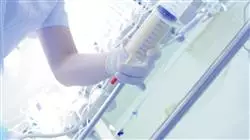University certificate
The world's largest faculty of nutrition”
Introduction to the Program
Acquire the necessary skills and competencies to work in the area of Clinical Nutrition with a high training intensity TECH Professional master’s degree"

The study of nutrition and metabolism in people has become more important considering that food helps to maintain good health. In this sense, clinical nutrition has developed a curative approach by trying to provide better nutrition taking into account people's ailments and, on the other hand, it maintains a preventive approach by providing the necessary tools to avoid the development of certain diseases.
In this sense, nutritionists focused on the clinical area are part of a multidisciplinary team that possesses scientific knowledge in their area of competence, with skills that allow them to apply efficient nutritional care to their patients. Consequently, they intervene in dietary treatment taking into account physiological and/or pathological needs, as well as dietary habits, socioeconomic, religious and cultural conditions to prevent and treat diseases.
The TECH Professional master’s degree offers the student the possibility of deepening and updating knowledge, using the latest educational technology. It provides a global vision of Clinical Nutrition while focusing on the most important and innovative aspects of adult nutrition, with an update on the nutritional therapy of the most prevalent pathologies; as well as pediatric nutrition including from the intrauterine phase to adolescence, and the diseases in which nutrition plays a highly relevant role.
This program provides specialization in the field of Clinical Nutrition in areas of particular interest such as:
- Nutrigenetics and Nutrigenomics
- Nutrition and obesity
- Sports nutrition
- Nutrition in chronic diseases
- Hospital dietetics
- Food allergies
The syllabus covers the main current topics in Clinical Nutrition in such a way that whoever masters them will be prepared to work in this field. Therefore, it is not just another diploma in your backpack, but a real learning tool to approach the topics of the specialty in a modern, objective way and with the ability to make a judgment based on today's most cutting-edge literature.
You will be trained by professionals with extensive experience in Clinical Nutrition, who will guide you throughout the learning process"
This Professional master’s degree in Clinical Nutrition contains the most complete and up-to-date scientific program on the market. The most important features of the program include:
- More than 100 clinical cases presented by experts in nutrition. The graphic, schematic, and eminently practical contents with which they are created contain information that is indispensable for professional practice
- It contains exercises where the self-assessment process can be carried out to improve learning
- Algorithm-based interactive learning system for decision-making for patients with feeding problems
- Clinical practice guidelines on the different pathologies related to nutrition
- All this will be complemented by theoretical lessons, questions to the expert, debate forums on controversial topics, and individual reflection assignments
- Content that is accessible from any fixed or portable device with an Internet connection
A training created and directed by expert professionals in Clinical Nutrition that make this TECH Professional master’s degree a unique opportunity for professional growth"
Its teaching staff includes renowned specialists in nutrition based on clinical practice, who bring the experience of their work to this training.
Thanks to the multimedia content developed with the latest educational technology, they will provide the Nutritionist with situated and contextual learning, i.e., a simulated environment that will provide an immersive training program to train in real situations.
The design of this program is based on Problem-Based Learning, by means of which the Nutritionist must try to solve the different professional practice situations that arise during the course. For this purpose, the Nutritionist will be assisted by an innovative interactive video system created by renowned and experienced experts in the field of nutrition with extensive teaching experience.
With this TECH Professional master’s degree you will be able to combine high intensity training with your personal and professional life, achieving your goals in a simple and real way"

You will be able to complete the TECH Professional master’s degree 100% online, adapting it to your needs and making it easier for you to take it while you carry out your full-time healthcare activity"
Why study at TECH?
TECH is the world’s largest online university. With an impressive catalog of more than 14,000 university programs available in 11 languages, it is positioned as a leader in employability, with a 99% job placement rate. In addition, it relies on an enormous faculty of more than 6,000 professors of the highest international renown.

Study at the world's largest online university and guarantee your professional success. The future starts at TECH”
The world’s best online university according to FORBES
The prestigious Forbes magazine, specialized in business and finance, has highlighted TECH as “the world's best online university” This is what they have recently stated in an article in their digital edition in which they echo the success story of this institution, “thanks to the academic offer it provides, the selection of its teaching staff, and an innovative learning method aimed at educating the professionals of the future”
A revolutionary study method, a cutting-edge faculty and a practical focus: the key to TECH's success.
The most complete study plans on the university scene
TECH offers the most complete study plans on the university scene, with syllabuses that cover fundamental concepts and, at the same time, the main scientific advances in their specific scientific areas. In addition, these programs are continuously being updated to guarantee students the academic vanguard and the most in-demand professional skills. In this way, the university's qualifications provide its graduates with a significant advantage to propel their careers to success.
TECH offers the most comprehensive and intensive study plans on the current university scene.
A world-class teaching staff
TECH's teaching staff is made up of more than 6,000 professors with the highest international recognition. Professors, researchers and top executives of multinational companies, including Isaiah Covington, performance coach of the Boston Celtics; Magda Romanska, principal investigator at Harvard MetaLAB; Ignacio Wistumba, chairman of the department of translational molecular pathology at MD Anderson Cancer Center; and D.W. Pine, creative director of TIME magazine, among others.
Internationally renowned experts, specialized in different branches of Health, Technology, Communication and Business, form part of the TECH faculty.
A unique learning method
TECH is the first university to use Relearning in all its programs. It is the best online learning methodology, accredited with international teaching quality certifications, provided by prestigious educational agencies. In addition, this disruptive educational model is complemented with the “Case Method”, thereby setting up a unique online teaching strategy. Innovative teaching resources are also implemented, including detailed videos, infographics and interactive summaries.
TECH combines Relearning and the Case Method in all its university programs to guarantee excellent theoretical and practical learning, studying whenever and wherever you want.
The world's largest online university
TECH is the world’s largest online university. We are the largest educational institution, with the best and widest online educational catalog, one hundred percent online and covering the vast majority of areas of knowledge. We offer a large selection of our own degrees and accredited online undergraduate and postgraduate degrees. In total, more than 14,000 university degrees, in eleven different languages, make us the largest educational largest in the world.
TECH has the world's most extensive catalog of academic and official programs, available in more than 11 languages.
Google Premier Partner
The American technology giant has awarded TECH the Google Google Premier Partner badge. This award, which is only available to 3% of the world's companies, highlights the efficient, flexible and tailored experience that this university provides to students. The recognition as a Google Premier Partner not only accredits the maximum rigor, performance and investment in TECH's digital infrastructures, but also places this university as one of the world's leading technology companies.
Google has positioned TECH in the top 3% of the world's most important technology companies by awarding it its Google Premier Partner badge.
The official online university of the NBA
TECH is the official online university of the NBA. Thanks to our agreement with the biggest league in basketball, we offer our students exclusive university programs, as well as a wide variety of educational resources focused on the business of the league and other areas of the sports industry. Each program is made up of a uniquely designed syllabus and features exceptional guest hosts: professionals with a distinguished sports background who will offer their expertise on the most relevant topics.
TECH has been selected by the NBA, the world's top basketball league, as its official online university.
The top-rated university by its students
Students have positioned TECH as the world's top-rated university on the main review websites, with a highest rating of 4.9 out of 5, obtained from more than 1,000 reviews. These results consolidate TECH as the benchmark university institution at an international level, reflecting the excellence and positive impact of its educational model.” reflecting the excellence and positive impact of its educational model.”
TECH is the world’s top-rated university by its students.
Leaders in employability
TECH has managed to become the leading university in employability. 99% of its students obtain jobs in the academic field they have studied, within one year of completing any of the university's programs. A similar number achieve immediate career enhancement. All this thanks to a study methodology that bases its effectiveness on the acquisition of practical skills, which are absolutely necessary for professional development.
99% of TECH graduates find a job within a year of completing their studies.
Professional Master's Degree in Clinical Nutrition
Nutritional diseases have become very relevant in recent times, a clear example is obesity, according to the World Health Organization (WHO), since 1975 obesity rates have tripled worldwide. One of the sectors most affected by this problem is early childhood; it is estimated that there are more than 41 million children between the ages of 1 and 5 who are obese or overweight. To combat this and other problems related to poor nutrition, TECH Global University offers the most complete and up-to-date Professional Master's Degree in Clinical Nutrition in the educational market. With our programs, interested people will obtain all the necessary thematic axes to be agents of change in their respective regions. In addition, with our programs we will update them in the latest advances in diagnosis, treatment and prevention of pathologies related to this important field of knowledge.
Professional Master's Degree in Nutrition 100% online
In TECH's Professional Master's Degree in ClinicalNutrition the student will be guided by the most experienced teachers in this discipline, which through high quality multimedia will improve their skills in solving complex situations, thereby the professional will be able to respond quickly and efficiently to the challenges that may arise during the development of your career. On the other hand, with us you will improve your knowledge in topics such as: advances in nutrition, nutrigenetics, bioenergetics, early childhood growth, among other contents that will be of vital importance to train you as a specialist with the highest quality standards.







